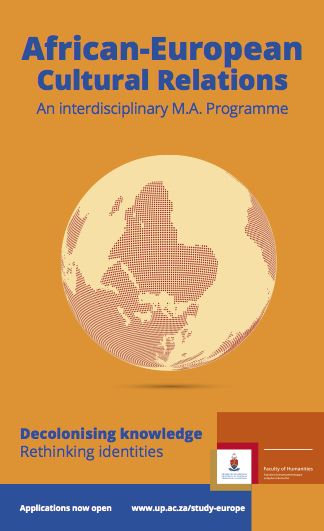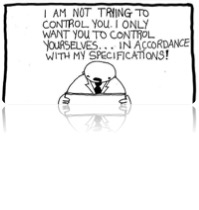Teaching
Benda Hofmeyr has been teaching Philosophy in disciplinary and interdisciplinary contexts since 2006. The institutions where she has taught include Dasarts (now the Academy of Theatre and Dance, Amsterdam University of the Arts), the Jan van Eyck Akademie, Maastricht, The Netherlands (Post-Academy for Art, Design & Reflection), the Radboud University Nijmegen, The Netherlands and the Department of Philosophy, University of Pretoria, South Africa, where she has held a tenured position since 2009.
Benda is a passionate lecturer and thrives on engaging with her students. Interested to know what Benda's postgraduate students think about her? Read her 2019 Honours student's feedback & comments .
The recent and ongoing courses she teaches include:
MA Programme in African-European Cultural Relations: Philosophy & History of African-European Cultural Relations
 The interrelatedness of philosophical conceptions of otherness, “history”, “agency” and “memory” of the mutual constructive forces will be examined, leading to an understanding that one cannot possess one’s (“own”) identity, history, tradition or culture, but rather that these are areas of cultural practice and construction that are continuously in flux and being negotiated.
The interrelatedness of philosophical conceptions of otherness, “history”, “agency” and “memory” of the mutual constructive forces will be examined, leading to an understanding that one cannot possess one’s (“own”) identity, history, tradition or culture, but rather that these are areas of cultural practice and construction that are continuously in flux and being negotiated.
Service Module (BA II) offered to the Faculty of Economic & Management Science 2020 & 2021: Introduction to Moral Philosophy

The practice of philosophy is as old as humanity itself. Philosophers deal with fundamental questions about reality, knowledge, human nature and so on. In this course, you will be introduced to the branch of philosophy known as ethics; the study of moral decision-making.
I’m sure you’re wondering how this course relates to your Economic and Management Sciences degree. Well, where human beings are involved, there’s no such thing as ‘just business’. There are political and moral elements to the nature of business decision-making, and because of this, business and finance students all over the globe are required to take a course in ethics at some point during their tertiary education. At the University of Pretoria, the Department of Philosophy has been entrusted by the EMS Faculty to present such an ethics course to you, one tailored to the unique challenges you will face as future decision-makers in South Africa and abroad.
As we have seen with current events, the world is looking for problem-solvers, and this is especially the case in the business world. Problem-solvers are people who know how to reason well and take all aspects of a problem into consideration. You need this module not only to give you an introduction to how exactly you can achieve this level of thinking, but also how to adapt it to a continuously changing business environment where the typical problems have evolved. These philosophical skills have arguably never been in higher demand than at the current moment. Career flexibility and uncertainty has made it imperative that the current generation of students not only adapt to changing times, but consistently think about fluid and sometimes precarious career opportunities and goals.
In such a context, the skills of autonomous thinking, argument analysis, and the ability to responsibly investigate and critique concepts and theories are crucial tools necessary to navigate a complex world fraught with challenges on scales ranging from the individual to the global. This course will indeed challenge the idea of business as a purely economic affair and it will skill you with the conceptual tools required to be able to reason effectively about the ethics of business decision-making.
Philosophy opens your mind by educating you to fearlessly question your beliefs, challenge arguments you are confronted with and construct your own reasoned viewpoints. This enables you to learn limitlessly about yourself, others, and the world in which we find ourselves. Philosophy teaches you second-order thinking, a skill that is in very high demand worldwide, and will serve you well not only for the rest of your career, but for the rest of your life.
Honours Module (BA IV) in Philosophy 2019
OMNES ET SINGULATUM / ALL AND EACH
Foucault & Governmental Rationality / Governmentality

There is hardly a discipline in the Humanities and Social Sciences that have not felt the reverberating impact of the work of French philosopher, Michel Foucault (1926-1984). A central and persistent preoccupation in his expansive corpus of interests is the machinations of power relations and their imbrication with truth claims or knowledge formations. In the course of his theorizations, the notion of ‘power/knowledge’ found expression in the neologism, “governmentality” – the coupling of government + rationality.
Defined succinctly as the “conduct of conduct”, government, in the broad sense of the term, is the attempt to shape human conduct by calculated means. Distinct from discipline, which seeks to reform designated groups through detailed supervision in confined quarters (prisons, asylums, schools), the concern of government is the well-being of populations at large. Its purpose is to secure the “welfare of the population, the improvement of its condition, the increase of its wealth, longevity, health, et cetera” (Foucault 1991: 100). To achieve this purpose requires distinctive means. At the level of the population, it is not possible to coerce every individual and regulate their actions in minute detail. Rather, government operates by educating desires and configuring habits, aspirations and beliefs. It sets conditions, “arranging things so that people, following only their own self-interest, will do as they ought” (Scott 1995: 202). Persuasion might be applied, as authorities attempt to gain consent. But this is not the only course. When power operates at a distance, people are not necessarily aware of how their conduct is being conducted or why, so the question of consent does not arise (cf. Li 2007: 275). Governmentality, then, refers to the rationality informing “government”, and how this rationality structures the field of possible actions and puts in place desired outcomes ‘from a distance’.
This module aims to harness the notion of “governmentality” as heuristic tool through which we may glean a critical understanding of central notions in Foucault’s corpus, although the notion itself only ever featured in the Collége de France lectures presented in 1978 and 1979 and on a few other occasions.
Honours Module (BA IV) in Philosophy 2017 & 2018
Genealogy, History, Origin: Uses & Disadvantages for Life

Nietzsche and later Foucault introduced genealogy as a certain critical methodology opposed to an understanding of history in terms of progress, development or teleology. It also contests history conceived as that which is capable of uncovering the origin of something as if its truth is to be found at its birth (a genetic fallacy is committed when one appeals to the origins of an idea in order to make a claim about the truth of the idea). What happens to history and its idols – ‘origin’ and ‘telos’ – when subjected to the genealogist’s hammer?
Our brief foray into the Philosophy of History will commence with Nietzsche’s essay, ‘The Uses and Disadvantages of History for Life’ (1874) – published in Untimely Meditations – in which Nietzsche critiques what he describes as ‘complacent historicism’. While Nietzsche subscribes to the thesis that every aspect and expression of human life is unavoidably conditioned by history, he vehemently rejects the whiggish consequences drawn from this thesis that history should be interpreted as the inevitable victory of progress over reaction.
In his essay, ‘Nietzsche, Genealogy, History’, Foucault provides us with a succinct overview and instructive interpretation of Nietzsche’s critical engagement with history and the manifold meanings of the notion of ‘origin’. What comes to light is the fact that the search for origins goes against the very grain of genealogy. Herkunft and Enstehung (as opposed to Ursprung) designate not the exact essence of things or their carefully preserved identities that can be unearthed by tracing back or restoring an unbroken continuity. Instead it shows the point of emergence to be place of confrontation, a place where a clash of forces had been staged. What emerges is neither essential nor necessarily linked to what came before it.
In his discussion of Foucault’s essay in The Signature of All Things, titled ‘Philosophical Archaeology’, Agamben ventures the question raised by Foucault but left unanswered: what happens once the notions of ‘origin’ or ‘subject’ have been conjured and dispelled? What are the consequences for our understanding of where things came from or began for the present and how does the ignominy of formation affect our imaginings of the future? If we understand the place of Herkunft to be not a place of foundation or inception, but rather as a non-place of opposition and dissolution, what precisely is the significance of this insight?
In The Names of History, Rancière critiques four schools of historiography, which he names (1) republican-romantic (represented by Michelet); (2) royal-empiricist (the royal chroniclers and contemporary revisionists such as Furet); (3) scientific history (Annales school); and (4) Marxist historiography. What is clear is that Rancière is calling for different thinking of history and it becomes apparent that he might be described as ‘a thinker of periods’ much like the ‘archaeological’ Foucault of The Order of Things. By revisiting multiple periods, Rancière comes to the conclusion that we are still in the period of class and classes. The untimely nature of class is of our age because our age is the period of nonrelation, of the excess of words and things brought about by the French Revolution. What is meant by ‘class’ in this context is not just what falls under the traditional Marxist-Leninist notion, but any classificatory category that can be re-appropriated by social movements to mean something else and placed at the service of struggle. From this point of view then, history repeats itself. In the Nietzschean sense, Rancière might be described as a thinker of continuity, not of progress but of continuity since wrongs are not corrected in the lessons learnt from history. History is the repetition of error, the rectification of which will not be found in thought but in struggle. What Rancière is saying is that when we look back at the French Revolution, in the face of biopolitics, neoliberalism and globalization, we must admit that nothing much has changed: history is the chronicling of on-going domination. In this sense, Rancière’s critical engagement with historiography may be likened to the wielding of the genealogist’s hammer.
In the second of Rancière’s commentaries on the revisionist historians of the French Revolution – Furet’s Interpreting the French Revolution (second part of the chapter, ‘The Excess of Words’) – he elaborates on a notion of the event as untimely or anachronistic. In tracing Rancière’s analysis of Furet’s account we will discover the second avenue through which we might be able link back to the questions raised by the genealogical methodologies of Nietzsche and Foucault, such as the meaning of conceiving of the point of emergence as a non-place of opposition and dissolution rather than as a place of inception. According to Rancière, as we shall see, in Furet’s interpretation of the French Revolution, the latter places a non-place at the centre of the event.
In this seminar series, we shall therefore attempt to come to a critical understanding of the genealogical methodologies of Nietzsche and Foucault by way of a close reading of a selection of key texts including Agamben’s reading of Foucault’s method. In the final instance, we shall venture into Rancière’s critical engagement with a number of historiographies in an attempt to think through some of the questions raised by a genealogical critique of ‘complacent historicism’.